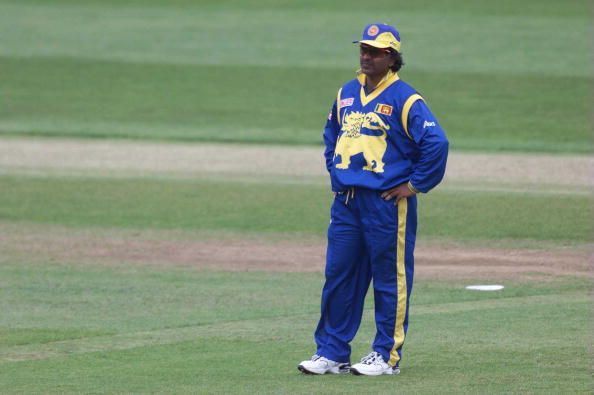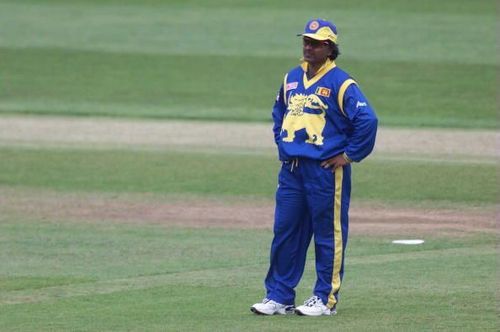
Cricket World Cup history: Arjuna Ranatunga, a true champion of Sri Lankan cricket

The World Cup was a roller-coaster ride for Arjuna Ranatunga. Sri Lanka, even though they had gained Test status a year-and-a-half before the 1983 World Cup, were still considered a band of no-hopers. In those days the team was expected to cause just the odd upset at best. They were a bunch of fighters rather than an outfit of brilliant performers.
No one epitomised this more than Ranatunga, his determined left-handed batting being as marked as his petulance on the field. He even bowled his right-arm slow-medium stuff regularly, with little success.
From such modest beginnings, to becoming a prolific scorer in the next three World Cups and to reach the pinnacle by leading his team to a title win in 1996, was an achievement without parallel. But in many ways he was to become a tragic hero after a dismal campaign to retain the Cup in 1999. His unceremonious exit and allegations of match-fixing are not fair returns for this true champion of Sri Lankan cricket.
Ranatunga began his World Cup stint well enough in 1983. He scored 31 against Pakistan, adding 57 for the fourth wicket with Brendon Kuruppu. In the second match, Ranatunga hit up 34 off the English attack, this time putting on 51 for the sixth wicket with Somachandra de Silva. There were also three ducks for Ranatunga in that tournament, but it was clear that this was a colt for the long distance.
So it proved to be. In 1987 he made an impact in virtually every innings. A knock of 24 in the opening tie against Pakistan was not really a harbinger of things to come.
In the next match at Karachi, Vivian Richards and the West Indies went on a record-breaking spree. Chasing a mammoth 360 for four in 50 overs was a hopeless task for the Sri Lankans. The loss of three quick wickets did not help, but Ranatunga added 55 for the fourth wicket with Asanka Gurusinha.
Thereafter he was associated in an unbroken 57-run stand with skipper Duleep Mendis. Ranatunga notched up his first half-century in the World Cup as the Sri Lankan challenge petered out.
In the next match which was dominated by England, Ranatunga top-scored with 40, adding 62 for the fourth wicket with Ranjan Madugalle.
As Sri Lanka ran the West Indies close in the second outing, Ranatunga made a valiant effort to pull off a win. He slammed an unbeaten 86 off 100 balls, including two consecutive sixes off Courtney Walsh besides 7 boundaries, putting on 70 for the fifth wicket with Mendis.
Had he received some more support from the other end, Sri Lanka may well have registered their first victory of the tournament. Ultimately, they fell 25 runs short of the West Indies score.
Sri Lanka now looked a demoralised outfit. Ranatunga, however, continued his good work, hitting 50 off the Pakistan attack. He combined well with Mendis again after the early batsmen had faltered. The two put on 80 for the fifth wicket, but it was always a lost cause after Pakistan had posted a near-300 total.
Ranatunga missed the last match. It may have been a disastrous tournament for the team, but it was a personal triumph for the rotund southpaw. He showed that he could hold his own against any attack.
In Australia in 1992, Ranatunga picked up from where he had left off in the previous World Cup. Zimbabwe posted a huge 312 for four in their 50 overs at Pukekura Park, New Plymouth, after which Sri Lanka began a stupendous run-chase.
Ranatunga put on 45 for the fifth wicket with Sanath Jayasuriya, then 61 for the sixth wicket with Hashan Tillekeratne. The archetypal determination was on display as he marched on to bring up an amazing three-wicket victory with 4 balls to spare.
Ranatunga top-scored with an unbeaten 88 off just 61 deliveries, with a six and 9 fours. Sri Lanka’s score of 313 is still the highest for a team batting second.
At this stage Ranatunga’s run of scores in five consecutive innings of the World Cup read 52 not out, 40, 86 not out, 50 and 88 not out - a total of 316 runs in the World Cup at an average of 158.
Ranatunga’s next moment of glory came when Sri Lanka met South Africa for the first time ever. He was the architect of a tremendous victory over a team that was making a good impression after a long exile.
Ranatunga took two for 26 off his 6 overs as the Proteas were dismissed for 195. Then coming in at 87 for four, he added 67 for the fifth wicket with opener Roshan Mahanama.
Ranatunga was not finished yet. While wickets continued to fall, he battled on to bring up a thrilling three-wicket triumph with just one delivery left. He returned to a standing ovation, unbeaten with 64 off 73 balls, having struck six fours. Ranatunga bagged his only man-of-the-match award in the World Cup for this outstanding performance.
The heroics were over for Ranatunga in the present tournament, though he continued to play cameos. But as events were to prove four years later, he had just reached base camp. He still had Everest to climb.
As the scene shifted once again to the sub-continent in 1996, Ranatunga found himself at the helm. Sri Lanka had come of age and were unstoppable in this tournament. They picked up free points in two matches as Australia and the West Indies refused to visit their shores in the wake of the ethnic conflict in the island. In between, they easily overcame Zimbabwe.
Sri Lanka’s first real test came when they were pitted against India at New Delhi. The hosts rattled up 271 for three in 50 overs and it appeared an uphill task for Sri Lanka. But this is where it began to dawn on everyone that the islanders had arrived.
After customary early heroics by Jayasuriya, the stage was set for Ranatunga to play his part. When Tillekeratne joined him, there were still 131 runs to get with six wickets in hand.
While Tillekeratne attacked, Ranatunga rotated the strike. Together they made the task look simple and brought up victory with 8 balls to spare.
Ranatunga remained unbeaten with 46. It was the beginning of a golden phase for his side.
As if to emphasize their awesome form, Sri Lanka put up a record-breaking performance against Kenya. Ranatunga raced to his fifty off just 29 balls, then a World Cup record, which Brendon McCullum brought down to 18 deliveries in 2015.
Ranatunga put on 106 for the fourth wicket with Aravinda de Silva. By the time the innings ended at an unprecedented 398 for five in 50 overs, Ranatunga had smashed an unbeaten 75 off 40 balls inclusive of a six and 13 fours, and also emulated De Silva by topping 5000 one-day runs. For good measure, Ranatunga bagged two for 31 off five overs.
These two matches had an ominous ring about them. Ranatunga’s team was the one to watch. If India were the dark horses in 1983, it was Sri Lanka’s turn in 1996.
Kim Hughes’ words had proved prophetic then, and this time it was Syed Kirmani’s, who said before the tournament: “It has been a tremendous season for them and they are already playing like an experienced side. Their fielding has improved by leaps and bounds and they have an ideal set of bowlers and batsmen to perform to a plan. In 1983 India was wearing the ‘underdog’ tag throughout till it emerged as the world champion. I find something identical to that in this Sri Lankan team.”
After easily disposing of England in the quarterfinal, Sri Lanka once again faced India at Calcutta. Ranatunga strode in at 85 for four, the team still not having recovered after early disasters despite Aravinda de Silva’s brilliance. Ranatunga put on 83 vital runs with Mahanama, before being dismissed for 35. Sri Lanka posted 251 for eight, and India flopped under the lights.
Amid great excitement Sri Lanka reached their first World Cup final after having made very little impression in the first five tournaments. The Australians put up 241 for seven in 50 overs. At 148 for three, Ranatunga joined Aravinda de Silva who continued to display irresistible form. They simply took the game away from the Australians.
With 10 overs left there were 51 runs to get. The pair needed only 6.2 of these overs as they cruised home. Ranatunga remained unbeaten on 47 off 37 deliveries with a six and 4 fours.
A team that had a mere four wins in five previous World Cups had now won six matches in a row in emphatic style to emerge champions.
It was truly the summit of Ranatunga’s glorious career as he lifted the exquisite Wills World Cup. It had been a long journey from Sri Lanka’s early days in international cricket. Ranatunga had been through all the years of struggle, and here he was, proudly holding aloft the gleaming trophy, the biggest prize in one-day cricket.
For his determined and at times belligerent batsmanship as well as bold leadership, Ranatunga deserves to be ranked among the best in the World Cup.
If 1996 was an unprecedented high, 1999 was a bitter disappointment. Travelling to England to defend the title, the team stumbled. Ranatunga did play a few useful innings, but the old magic was missing.
He scored 32 in the opener against England, putting on a face-saving 84 for the sixth wicket with Romesh Kaluwitharana. He then took 42 off the Indian attack after the opponents had put up a huge score of 373.
There was a touch of nostalgia one last time as Ranatunga and De Silva combined in a stand of 68 for the fifth wicket.
Finally, as his team ended an unhappy tournament on a winning note, Ranatunga scored 50 against Kenya, putting on 104 for the fourth wicket with Marvan Atapattu. Sri Lanka could not make it to the super-six.
That was to mark the end of Ranatunga’s reign as captain. Not long after, his cricketing career too drew to a close.
One of the greatest triers the game has seen, Ranatunga brought considerable glory to his country, not the least in the World Cup. He notched up nearly a thousand runs in the premier tournament at a fine 46-plus average and an eminently acceptable strike-rate of 80.95, particularly for the 20th century.
Ranatunga's contribution to Sri Lankan cricket is perhaps unrivaled. That is how he must be remembered.
Arjuna Ranatunga’s World Cup batting and fielding record:
Matches 30, Highest Score 88*, Runs 969, Average 46.14, Strike-rate 80.95, Fifties 7, Catches 7
Also read - World cup most man of the match
Follow Sportskeeda for all the updates on World cup points table, news, live scores, World Cup most wickets, schedule, most runs, and fantasy tips.